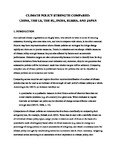Climate policy strength compared: China, the US, the EU, India, Russia, and Japan
| dc.contributor.author | Compston, H | |
| dc.contributor.author | Bailey, Ian | |
| dc.date.accessioned | 2016-10-13T09:22:21Z | |
| dc.date.available | 2016-10-13T09:22:21Z | |
| dc.date.issued | 2016-02-17 | |
| dc.identifier.issn | 1469-3062 | |
| dc.identifier.issn | 1752-7457 | |
| dc.identifier.uri | http://hdl.handle.net/10026.1/6512 | |
| dc.description.abstract |
The few systematic international comparisons of climate policy strength made so far have serious weaknesses, particularly those that assign arbitrary weightings to different policy instrument types in order to calculate an aggregate score for policy strength. This article avoids these problems by ranking the six biggest emitters by far – China, the US, the EU, India, Russia, and Japan – on a set of six key policy instruments that are individually potent and together representative of climate policy as a whole: carbon taxes, emissions trading, feed-in tariffs, renewable energy quotas, fossil fuel power plant bans, and vehicle emissions standards. The results cast strong doubt on any idea that there is a clear hierarchy on climate policy with Europe at the top: the EU does lead on a number of policies but so does Japan. China, the US, and India each lead on one area. Russia is inactive on all fronts. At the same time climate policy everywhere remains weak compared to what it could be. Policy relevance This study enables climate policy strength, defined as the extent to which the statutory provisions of climate policies are likely to restrict GHG emissions if implemented as intended, to be assessed and compared more realistically across space and time. As such its availability for the six biggest emitters, which together account for over 70% of global CO2 emissions, should facilitate international negotiations (1) by giving participants a better idea of where major emitters stand relative to each other as far as climate policy stringency is concerned, and (2) by identifying areas of weakness that need action. | |
| dc.format.extent | 145-164 | |
| dc.language | en | |
| dc.language.iso | en | |
| dc.publisher | Informa UK Limited | |
| dc.subject | climate change mitigation | |
| dc.subject | climate change policies | |
| dc.subject | governance | |
| dc.subject | international comparisons | |
| dc.subject | international negotiations | |
| dc.subject | policy instruments | |
| dc.title | Climate policy strength compared: China, the US, the EU, India, Russia, and Japan | |
| dc.type | journal-article | |
| dc.type | Journal Article | |
| plymouth.author-url | https://www.webofscience.com/api/gateway?GWVersion=2&SrcApp=PARTNER_APP&SrcAuth=LinksAMR&KeyUT=WOS:000368733100002&DestLinkType=FullRecord&DestApp=ALL_WOS&UsrCustomerID=11bb513d99f797142bcfeffcc58ea008 | |
| plymouth.issue | 2 | |
| plymouth.volume | 16 | |
| plymouth.publication-status | Published | |
| plymouth.journal | Climate Policy | |
| dc.identifier.doi | 10.1080/14693062.2014.991908 | |
| plymouth.organisational-group | /Plymouth | |
| plymouth.organisational-group | /Plymouth/Faculty of Science and Engineering | |
| plymouth.organisational-group | /Plymouth/Faculty of Science and Engineering/School of Geography, Earth and Environmental Sciences | |
| plymouth.organisational-group | /Plymouth/REF 2021 Researchers by UoA | |
| plymouth.organisational-group | /Plymouth/REF 2021 Researchers by UoA/UoA14 Geography and Environmental Studies | |
| plymouth.organisational-group | /Plymouth/Users by role | |
| plymouth.organisational-group | /Plymouth/Users by role/Academics | |
| dc.identifier.eissn | 1752-7457 | |
| dc.rights.embargoperiod | Not known | |
| rioxxterms.versionofrecord | 10.1080/14693062.2014.991908 | |
| rioxxterms.licenseref.uri | http://www.rioxx.net/licenses/all-rights-reserved | |
| rioxxterms.type | Journal Article/Review |


